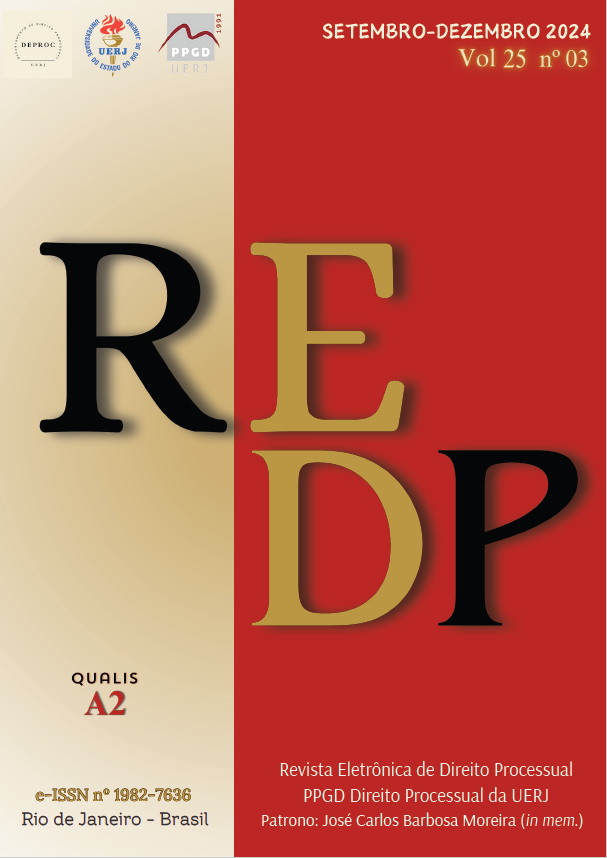DIGITISATION IN CIVIL JUDICIAL COOPERATION IN THE EUROPEAN UNION: AN ANALYSIS OF ITS EVOLUTION
Resumo
O objetivo do presente documento é estudar a legislação europeia relativa ao intercâmbio eletrónico transfronteiriço de dados relativos aos processos judiciais civis. Para o efeito, será analisada a evolução do Espaço Europeu de Liberdade, Segurança e Justiça, desde a assinatura do Tratado de Maastricht em 1992 até aos esforços legislativos dos últimos anos para reforçar a cooperação judiciária entre os Estados-Membros através da utilização das novas tecnologias. Será dada especial ênfase ao Regulamento (UE) 2022/850 do Parlamento Europeu e do Conselho, de 30 de maio de 2022, relativo a um sistema informatizado de intercâmbio eletrónico transfronteiriço de dados no domínio da cooperação judiciária em matéria civil e penal. Isto faz do e-CODEX o principal sistema europeu de intercâmbio eletrónico de dados processuais entre autoridades judiciais. Analisaremos, por conseguinte, as principais características deste sistema, abordando simultaneamente as questões relacionadas com a sua gestão eficiente e o respeito necessário a demonstrar na sua utilização em relação ao tratamento de dados pessoais. Com base no artigo 67.º, n.º 3, do TFUE, em geral, e no artigo 81.º, n.º 1, do TFUE, em matéria civil, o TFUE prevê que a cooperação judiciária deve respeitar os princípios do reconhecimento mútuo e da aproximação das legislações. No entanto, a criação de um verdadeiro direito processual europeu está ainda muito longe, sendo os maiores esforços dirigidos não para o estabelecimento de regras comunitárias únicas mas, numa perspetiva talvez menos ambiciosa mas certamente mais respeitadora das tradições jurídicas dos Estados-Membros, para a homogeneização dos direitos processuais internos. O objetivo da aproximação legislativa em matéria de processo civil é promover o reconhecimento mútuo das decisões proferidas pelas autoridades judiciais de um Estado-Membro que devam ser executadas no território de outro.
É aqui que a digitalização da justiça tem um papel fundamental a desempenhar. A este respeito, a União Europeia deve promover a adaptação dos sistemas judiciais nacionais à nova realidade digital, fomentando a cooperação judiciária transfronteiriça através da automatização dos procedimentos de intercâmbio de dados processuais, da utilização de técnicas de comunicação telemática e da interoperabilidade dos sistemas digitais utilizados pelas autoridades judiciais dos Estados-Membros. De facto, uma administração da justiça digitalizada e a utilização das tecnologias da informação e da comunicação promoverão, sem dúvida, uma cooperação judiciária muito mais estreita, mais rápida e mais eficaz.
Downloads
Publicado
Como Citar
Edição
Seção
Licença
Copyright (c) 2024 Ana María Vicario Pérez

Este trabalho está licenciado sob uma licença Creative Commons Attribution 4.0 International License.
Todos os artigos publicados na Revista Eletrônica de Direito Processual (REDP) (Departamento de Direito Processual, Universidade do Estado do Rio de Janeiro, Brasil) são licenciados por meio de uma Licença Creative Commons - Atribuição 4.0 Internacional (CC BY 4.0).
Os autores retêm os direitos autorais de seu artigo e concordam em licenciar seu trabalho com a licença CC BY 4.0, aceitando assim os termos e condições específicos desta licença disponíveis no seguinte website: https://creativecommons.org/licenses/by/4.0/legalcode.
- Os autores concedem à REDP o direito de primeira publicação, de se identificar como publicadora original do trabalho e concedem à revista uma licença de direitos não exclusivos para utilizar o trabalho das seguintes formas: Reproduzir, vender e distribuir cópias eletrônicas ou impressas do manuscrito como um todo, de partes específicas do manuscrito e de suas traduções para qualquer idioma;
- O uso do artigo por terceiros é livre, contanto que a integridade da publicação seja mantida e seus autores originais, periódico de primeira publicação e detalhes de citação sejam identificados.
Dentro dos termos da licença, os autores podem entrar em acordos contratuais adicionais separados para a distribuição não exclusiva da versão publicada do trabalho na revista.
Copyright and Licensing
All articles published in the Procedural Law Electronic Review (REDP) (Department of Procedural Law, State University of Rio de Janeiro, Brazil) are licensed under a Creative Commons License - Attribution 4.0 International (CC BY 4.0).
- Authors retain copyright to their article and agree to license their work under the CC BY 4.0 license, thereby accepting the specific terms and conditions of this license available at the following website: https://creativecommons.org/licenses/by/4.0/ legal code.
- Authors grant REDP the right of first publication, to identify itself as the original publisher of the work, and grant the journal a non-exclusive license to use the work in the following ways: Reproduce, sell and distribute electronic or printed copies of the manuscript as a whole, of specific parts of the manuscript and its translations into any language;
- Use of the article by third parties is free, as long as the integrity of the publication is maintained and its original authors, first publication journal, and citation details are identified.
Within the terms of the license, authors may enter into separate additional contractual agreements for the non-exclusive distribution of the published version of the work in the journal.




